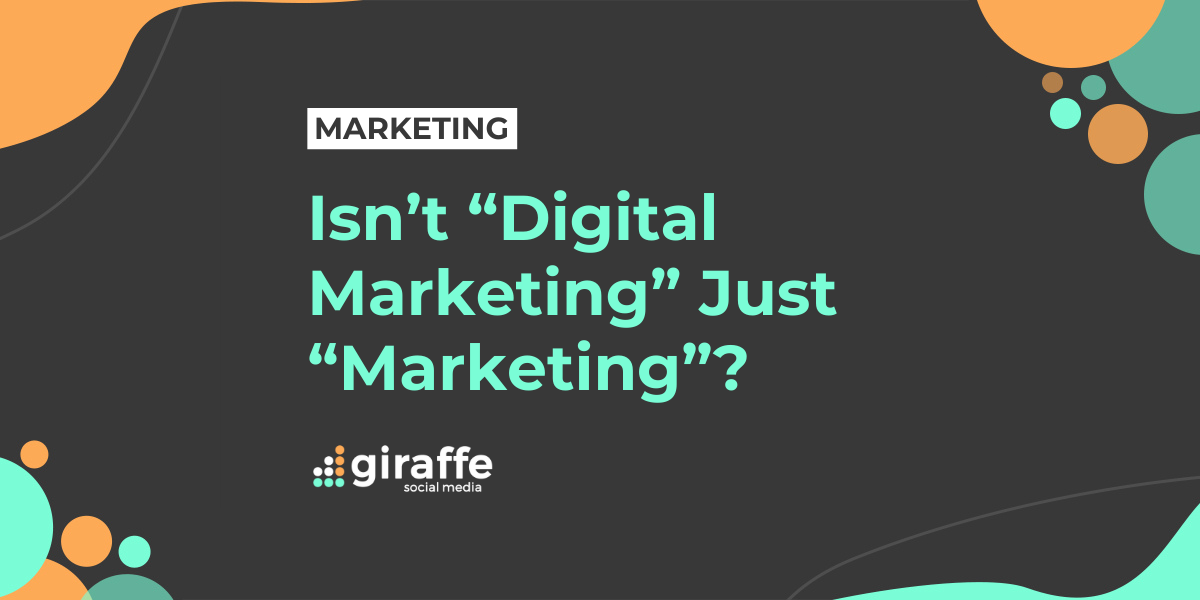The power of digital marketing is a very real and discernible thing. You don’t have to look far to find evidence of successes that businesses have had because of their digital presence. So why do we still call it ‘digital marketing’? Isn’t it just ‘marketing’ now?
What is Marketing?
Marketing “refers to any actions a company takes to attract an audience to the company’s product or services through high-quality messaging.” Beyond the attraction of new customers, marketing is also “present in all stages of the business, beginning to end,” keeping current customers happy, engaged, and thinking about a brand. Good marketing not only sells/promotes but helps businesses retain customers and create brand loyalists.
What is Digital Marketing?
So, if marketing is an all-encompassing term that covers a range of promotional activities, what is digital marketing? Digital marketing is a term similar in usage to ‘marketing’; it’s a phrase we use to describe marketing that happens through online channels. Many years ago, when marketing online was a particularly new concept, the two terms were useful to help differentiate between something that we had already established as important (marketing) and something that was, at the time, still growing in popularity and importance (digital marketing).
Digital marketing involves a range of marketing channels and methods, including but not limited to:
- Social media marketing (organic and paid),
- Content marketing,
- Email marketing,
- Search engine marketing and optimisation,
- Pay-per-click advertising,
- Affiliate marketing,
- Native advertising (sponsored content),
- And marketing automation.
Nowadays, with social media and the digital world very much a part of daily life and business, wouldn’t it make sense to amalgamate the two?
Online VS Offline Marketing
As if it wasn’t enough that online marketing is so effective, some argue that traditional marketing methods are losing favour to digital methods. Traditional marketing includes advertising in anything from printed material for distribution such as magazines and newsletters, in-person events, direct mail, broadcast including radio and television, and telemarketing.
According to 2020 statistics, though, “expenditure on online marketing will make up 46% of the total global ad spend in 2021.” With offline marketing taking up just over half of global ad spend, it’s not accurate to say that traditional marketing is entirely obsolete. While some modern and newer businesses solely rely on online marketing methods, many businesses and industries have a need for traditional marketing methods alongside or instead of an online presence. Small businesses and retail stores often rely on word of mouth, local community events/promotions, industry publications, direct mail, and local radio/TV as a large portion of their marketing efforts.
Plus, if your target customers and audience aren’t online, why advertise there? Businesses with older customers tend to lean more into offline marketing due to the disparity in internet usage between young and old; in 2020 in the UK, 99% of surveyed adults aged 16 – 44 years old were recent internet users, compared to 54% of adults aged 75 and over. Still, since most people are online now, online marketing is usually worth your while.
Hasn’t the merger of terms happened already?
In 2013, research and analysis company Forrester predicted that ‘Digital Marketing’ was going to become ‘Marketing’ in that year – as all marketers’ output was set to become “inherently digital”. Either they were wrong, or somebody failed to tell all the digital marketers.
There was intrigue and discussion around the topic, with countless articles written about it, alongside plenty of heated discussions on LinkedIn. Their arguments were essentially the same as ours: marketing is marketing and digital is a discipline within it. Many appeared to be bothered by terminology, but we reckon that was not the real issue. What was and still is important is recognising what to prioritise to promote evolution.
So, what should we call it then?
Ultimately, we cannot say for sure that digital marketing and marketing are equivalent, interchangeable terms. Due to the prevalence of online media, it is implied within the use of “marketing” that you are referring to digital channels, but this isn’t always true. Plus, there are now so many sub-divisions of marketing (of which digital marketing is one) that simply saying “marketing” or even “digital marketing” isn’t specific enough.
“Marketers” is a broad term used to describe someone working in the realm of marketing, but it is by no means specific. There are now countless specialised roles within marketing to provide specific insight into your marketing function: Social Media Marketing Manager, Content Marketing Manager, Digital Marketing Contributor, Online Marketing Strategist, PPC Marketing Expert, the list goes on. These are all categories within digital marketing, which in turn sits under the marketing umbrella.
Marketing is very much the industry, and like every other industry, it takes a huge variety of skills and disciplines to be successful. The same is true for digital marketing efforts as well – there are so many online marketing platforms and areas of expertise that the way to succeed is to employ a team with a wide skillset.
Need help with social media marketing, content marketing, and email marketing? Request a proposal today.
Editor’s Note: This article was published in November 2019 and has been updated for accuracy and relevance in August 2021.






